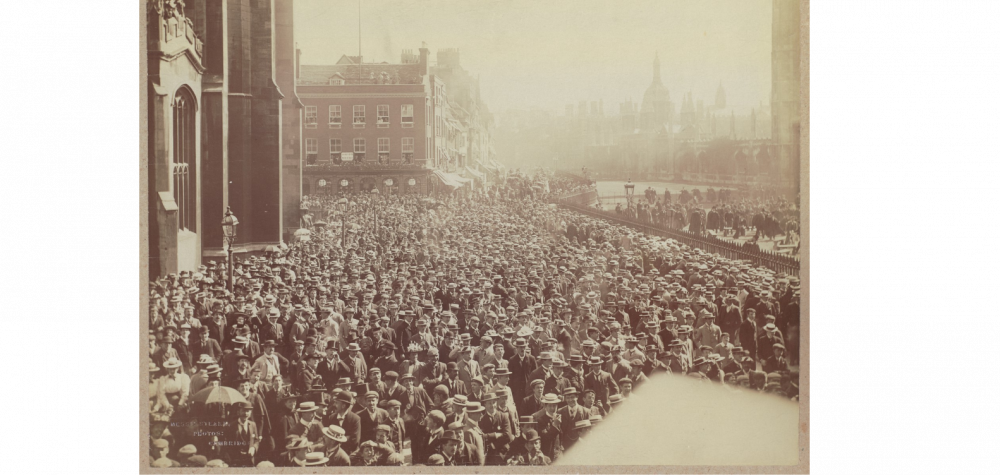MPhil in Modern British History

Overview
The MPhil in Modern British History offers students an exciting and intellectually stimulating course, combining research skills and in-depth understanding of the development and latest innovations within modern British history. At its core, the MPhil provides the opportunity to shape your own intellectual trajectory and questions through undertaking your dissertation in consultation leading historians in the field. The tailored, individual and closely supervised dissertation work is complemented by the importance placed in the course of group work and the creation of a supportive intellectual community. You'll emerge with excellent skills for undertaking advanced research, and a degree that will be highly valued in institutions across the world. The advanced research and writing skills gained will also be of immediate use in a wide variety of occupations.
British History at the University of Cambridge combines the study of the individual polities and nations of England, Scotland, Wales and Ireland with the study of their interactions with one another, with the European Continent and the British Empire. It draws on established strengths across the Faculty in political thought, political history, economic history, social and cultural history and global history to consider Britain’s modern experience in the light of these broader geographical and analytical perspectives.
The MPhil in Modern British History offers taught courses and a dissertation over a 9-month programme. Students take three courses in the first two terms – a mandatory core course focusing on historiographical debates and thematic approaches, and two optional courses, including several comparative options.
The 15–20,000 word dissertation is the centrepiece of the course, and will be planned and undertaken through close work with your supervisor. Regular supervisions will enable the identification of key questions and ideas to address, as well as archival sources and a sense of the wider significance of your research. The supervisor will be chosen prior to admission according to your research interests, and will assist you throughout the course to make the most of the very full intellectual resources that Cambridge can offer.
Follow the MPhil in Modern British History on Twitter to find out more about our exciting work and what our students are up to: @CamModBrit
At a glance
All students will submit a thesis of 15,000–20,000 words, worth 70 per cent toward the final degree.
Students also produce three 3,000-4,000-word essays, two in Michaelmas term and another in Lent term; each essay is worth 10% of the final degree grade.
All students admitted to the MPhil in Modern British History will be assigned a supervisor to work with them throughout the course, but crucially on the dissertation. Students will meet regularly with their supervisor throughout the course.
Students can expect to receive:
- regular oral feedback from their supervisor, as well as termly online feedback reports;
- written feedback on essays and assessments and an opportunity to present their work;
- oral feedback from peers during graduate workshops and seminars;
- written and oral feedback on dissertation proposal essay to be discussed with their supervisor; and
- formal written feedback from two examiners after examination of a dissertation.
If you have any questions, drop us a line on mod-brit@hist.cam.ac.uk

Aims of the Course
- Offers students who have completed degrees in which History is the main or at least a substantial component the opportunity to consolidate their knowledge of modern British history. It is particularly appropriate for those who may wish to continue on to a PhD, at Cambridge or elsewhere, in modern British history. It is also well-suited for those who seek simply to explore modern British history at a deeper level, and to develop generic independent research skills drawing on the unique resources that a specialism in modern British history offers.
- Immerses students in an extremely rich and plural historiographical landscape. Formerly rooted in the nineteenth-century quest for a national political history, and for long fixated on Whig narratives of the rise of liberty and democracy, modern British history has more recently diversified along the lines of identity categories such as class, race, and gender, but also novel analytical perspectives privileging religion and spirituality, the role of ideas and new educational movements, migrations and transnational exchanges, new understandings of selfhood, the body and emotions.
- Draws on the unique range of expertise available at the University of Cambridge, with dozens of postdoctoral scholars available to advise and supervise research.
- Trains students in the use of the printed, manuscript, visual and oral sources for the study of British history, drawing on the collections of the University Library, the Churchill Archives Centre (which holds the private papers of 600 key individuals in modern British history including Winston Churchill, Enoch Powell and Margaret Thatcher), 9 world-class museums and over 100 other libraries and archives in Cambridge.
- Provides an opportunity for students to undertake, at postgraduate level, researching and writing a piece of original historical research under close supervision by an acknowledged expert. For many students, this will provide the gateway to publication.
- Exposes students to the full range of intellectual and professional experiences that can be provided by Cambridge’s very extensive historical community, including over thirty specialist research seminars that meet weekly or fortnightly, plus interdisciplinary forums such as CRASSH (the university’s centre for humanities and social science research). There are further tailor-made opportunities for outreach and dissemination of academic research, including work in digital humanities and multi-media.
By the end of the programme, students will have acquired:
- a firm grasp of the historiographical debates in Modern British History;
- research skills relevant to the specific area in which they will have written a dissertation;
- the ability to situate their own research findings within the context of previous and current interpretative scholarly debates in the field.
The Course
Course Outline and Schedule
There are five components to the MPhil in Modern British History:
- Core course
- Research challenge workshop
- First option
- Second option
- Dissertation
Core Course: Debates in Modern British History
The core course is designed to introduce students to some of the major historiographical questions that have shaped the study of modern British history. Each class will invite you to think about important themes, classic texts, and the current state of the field. The course will present you with a range of different methods and approaches to studying the past, and will help you to contextualise your own specialist research in broader historiographical contexts. A subject specialist will lead each seminar, and students will be expected to read the assigned texts and contribute actively to the seminar discussions.
Topics for 2023-24
- The making and unmaking of the British union since c. 1700
- The first industrial nation
- The death of Christian Britain?
- Black British History
- Liberalism and its Limits
- Gender and sexuality
- Britain since the 1970s
- Student Conference
Core Course: Research Challenge in Modern British History
This programme of workshops in the Michaelmas and Lent Terms, plus a Lent Term project, aims to introduce and develop some of the key skills of historical research. Through seminars and group work, all MPhil participants will explore the ways in which modern British historians might identify and use sources of diverse range of types, as well as reflecting on what makes for excellent historical writing and analysis. The Lent Term project will further encourage the group to reflect on the ways in which historical research might engage and be communicated to different audiences.
This element of the course is not for credit, though attendance and completion of the preparatory tasks assigned for each session is compulsory.
Topics for 2023-24:
- Historical Analysis
- Effective Academic Writing
- Deconstructing the Archive
- Women’s Television History in the Connected Histories of the BBC
- Lent Term project: Exhibiting the Past
Core Course: Debates in Modern British History (weekly class x 8 weeks)
Option 1: (weekly seminar x 8 weeks)
Dissertation research and supervision
Applying to the course
To apply to the MPhil in Modern British History, you will need to consult the relevant pages on the Postgraduate Admissions website (click below).
Since applications are considered on a rolling basis, you are strongly advised to apply as early in the cycle as possible.
On the Postgraduate Admissions website, you will find an overview of the course structure and requirements, a funding calculator and a link to the online Applicant Portal. Your application will need to include two academic references, a transcript, a CV/ resume, evidence of competence in English, a personal development questionnaire, two samples of work and a research proposal.
Research proposals are 600–1,000 words in length and should include the following: a simple and descriptive title for the proposed research; a rationale for the research; a brief historiographic context; and an indication of the sources likely to be used. The document should be entitled ‘Statement of Intended Research’. Applicants are encouraged to nominate a preferred supervisor, and are invited to contact members of the Faculty in advance of submitting their application to discuss their project (see our Academic Directory: https://www.hist.cam.ac.uk/directory/academic-staff).
Below are some anonymised examples of research proposals, submitted by successful applicants to the MPhil in Modern British History. You may use these to inform the structure of your submission. Please note that they are purely for guidance and not a strict representation of what is required.
Modern British History - Research Proposal 1
Modern British History - Research Proposal 2
Modern British History - Research Proposal 3
Modern British History - Research Proposal 4
Assessment & Dissertation
Part I
Each of three modules in Michaelmas and Lent (one Compulsory Core, and two Options) will require a 3,000-4,000 words essay (or equivalent). Each will count toward 10% of the final degree mark, for a total of 30%. Taken together, these are Part I, and students must receive passing marks in order to move to Part II.
The Research Challenge is compulsory but does not count towards the overall mark.
Students will also prepare a 2,000 word dissertation proposal essay due in the Lent Term. This essay will be unassessed but students will meet with their supervisor to discuss the essay and get feedback.
Part II
The Dissertation or Thesis is Part II of the course. Each student on the MPhil will prepare a thesis of 15,000-20,000 words.The thesis will be due in early-June and will count for 70% of the final degree mark.
An oral examination will only be required in cases where one of the marks is a marginal fail.
The Dissertation, or thesis, is the largest element of the course, worth 70% of the final mark.
Students are admitted to the University on the basis of the research proposal, and each student will be assigned a Supervisor who will support the preparation of a piece of original academic research. Candidates must demonstrate that they can present a coherent historical argument based upon a secure knowledge and understanding of primary sources, and they will be expected to place their research findings within the existing historiography of the field within which their subject lies.
All students should be warned that thesis supervisors are concerned to advise students in their studies, not to direct them. Students must accept responsibility for their own research activity and candidacy for a degree. Postgraduate work demands a high degree of self-discipline and organisation. Students are expected to take full responsibility for producing the required course work and thesis to the deadlines specified under the timetable for submission.
